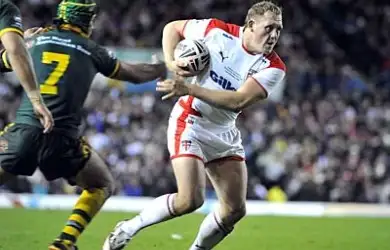England ready for Four Nations

England will hope to avenge their previous tour down under by going one better in this year’’s Four Nations campaign.
Under the guidance of Brian Smith, Steve McNamara will hope to do what Tony Smith, Brian Noble and David Waite couldn’’t, and that is to win a test series against the Australians. It’ has been 40 long years since the national side last won a series against the green and golds. That was a 2-1 series win down under in which Great Britain won 22 of their 24 touring games.
Times are tough for England, with Steve McNamara announcing his 24 man squad after the Super League Grand Final and the 18-all draw against Cumbria for Garry Purdham’s memorial match being followed by Saturday’s warm-up match draw with New Zealand Maori. The worrying aspect for England is while they may have only played half a side against Cumbria, if half of the final squad that jetted off to New Zealand could only draw against a regional side, how will they fair against a full test side?
On paper England look like an extraordinary side in the forwards. Even without former captain Jamie Peacock they are still a world class outfit, although the loss of Adrian Morley on Saturday will have left a gaping whole in the squad, not just on the pitch, but off it too.
But with James Graham and James Roby in the middle, England have a front row that can force their way up the field and tire the opposition around the play the ball. Back rowers Sam Burgess and Gareth Ellis provide NRL experience so McNamara has two fearsome forwards giving the centres and wingers room to move around the edges of the field. It’’s more than likely Sean O’’Loughlin will lock the scrum at loose forward, completing a fearsome set of forwards with plenty of experience and quality. The forwards pretty much pick themselves. The headache for McNamara and Smith is who to select in the backs.
The limited selection of choice in the backs of all 14 Super League clubs leaves a lot to be desired, and this could prove to be England’’s biggest shortfall down under. Popular opinion amongst almost every fan of Super League is that of certain disbelief at how certain players have been selected, and others omitted.
Martin Gleeson, a player who has had his fair share of off field troubles, fails to make the squad despite having a wonderful end to the season and scoring almost twice as many tries as Tony Clubb. Ryan Hall makes the squad despite scoring fewer tries than Warrington’’s Chris Riley. McNamara must have his reasons for selecting the players he has chosen, but on paper he hasn’’t chosen the strongest set of three quarters available to him.
But McNamara’s selection hasn’t been helped by injuries to Kyle Eastmond, Leon Pryce, Danny McGuire and Chris Bridge, which have limited McNamara’’s options at six and seven. Sam Tomkins understandably takes the number six shirt, but number seven could arguably be worn by Luke Robinson. Robinson, like team mate Kevin Brown who also makes the cut, was rejected by Wigan in 2004. The lack of strength in depth shows that despite playing five fewer games than Robinson, Kyle Eastmond was able to score 11 more tries than the Huddersfield scrum half. Danny McGuire even created more try assists and made more metres than Robinson, while Richie Myler scored 15 tries compared to Robinson’’s four touchdowns.
While Myler wasn’’t chosen to travel through choice, the other two show that long term injuries can prove costly for international success. The argument that this is down to a long hard season can wait for another day, for now England have to go with what is available to them. Despite insistence from critics that the backs are no where near good enough to compete against the big two, McNamara has selected the best he has available to him. Overall, a final appearance at Suncorp Stadium on October 13 would be a successful campaign for England, as on paper they really are against the odds. The same could be said twelve months ago, and look how hard we pushed Australia in the final at Leeds for an hour.
But beware of the worst. A loss to Papua New Guinea, and therefore a bottom place finish, would demand a serious post-tour inquest from the Rugby Football League by the start of the next season. A fourth placed finish could arguably class this tour as the worst in English RL history.